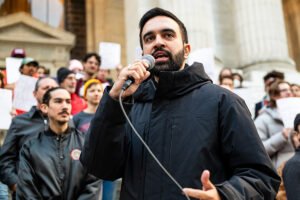
August 30, 2017; NPR
Since Trump’s election last year, many have been looking forward to the next presidential election, and some are taking matters into their own hands and are exploring a run for office themselves. Some of them are turning to Crowdpac, a new Silicon Valley crowdfunding platform for politics.
Until now, there hasn’t been an online method for a potential candidate to test a run, especially financially, without having to commit. Crowdpac, which is nonpartisan, helps people find candidates to support by ranking them on the issues. Users who are potential donors can clarify their own stances on issues and get matched with appropriate potential candidates. Users can nominate others as potential candidates as well; any pledges convert to donations only when a potential candidate formally declares a run.
Cofounder and Chief Operating Officer Gisel Kordestani said, “The goal of this product is simple—to help potential candidates build confidence and grow their support before they take the plunge.”
This is particularly important for women, poor people, and people of color, who are more likely to run when they are encouraged by their peers. According to NPR, to date, “there’s a 10-1 ratio of Democrats to Republicans seeking support on Crowdpac.” The platform is seeing “disproportionally high use among women candidates, people under 35, and non-lawyers (scientist, doctors, and professors).” According to OZY, “more than 60 percent of those running for office on Crowdpac are millennials.”
Sign up for our free newsletters
Subscribe to NPQ's newsletters to have our top stories delivered directly to your inbox.
By signing up, you agree to our privacy policy and terms of use, and to receive messages from NPQ and our partners.
Jon Huey, campaign manager for California Rep. McClintock’s reelection, wrote to NPR, “every race in the country is going to be hotly contested because of the temper of the times.”
Crowdpac, which also uses data to paint portraits of political life, ranked 300 cities in the U.S. and found that some regions of the country are more polarized than others.
Of the top 100 cities, more than half, 53 percent, were in the South, compared with 30 percent in the West and 17 percent in the Midwest. None of the 100 most polarized cities were located in the Northeast. Texas is home to the largest number of polarized cities…[at] 18…and five of the top 10.
Kathryn Allen, who so far has brought in the most on the platform, decided to test a run after attending Rep. Jason Chaffetz’s town hall where angry constituents asked questions that he dodged. In an interview with USA Today, Allen said, “I came away from that meeting feeling like (Chaffetz) was a poor public servant who was out of touch with his constituents.” She wasn’t alone. With a little help from Rosie O’Donnell, who retweeted Allen to her “more than 1 million followers,” Allen raised $564,000 from 15,000 donations averaging between $35 and $45 in her first quarter. She eventually lost to Chaffetz, which highlights a shortcoming of the platform. Though she was able to “galvanize people around the country who want Chaffetz out…the people in Utah still need convincing.”
An online search for Crowdpac reveals that, though still in its startup phase, it’s referred to widely in news about political challengers. Chris Rabb, an educator, used the platform last year to defeat an establishment-backed incumbent and “snatch a state House seat.”
Kordestani said, “We’re using technology to try to help the average citizen to connect and engage in politics.” Crowdpac CEO Steve Hilton, author, Stanford professor former top advisor to the U.K.’s David Cameron, and host of his own Fox show, calls it “the open platform for new politics.”—Cyndi Suarez











